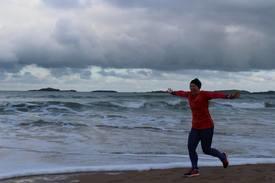How do you know how to weigh meat?

ALMG1992
Posts: 15 Member
Eveytime I eat meat, I never know how to record it into MFP and was wondering how do you weigh it?
0
Replies
-
With a scale?
 0
0 -
Oh Lol I didn't know. I guess I have to go purchase a scale. I always assumed that the packages would have how many ounces are per meat0
-
Weight watchers says to use the palm of your hand for 3-4 oz or deck of cards as visual if u can't use scale0
-
That would make sense lol because I do not own a scale yet. Thank You for the information
 0
0 -
Yep get a scale then once you weigh it in whatever unit the nutrition label says (usually grams), you take the weight of the food and divide by serving size to get your # of servings.
Example for me today- I ate a chicken breast that weighed 9.1oz. The serving size was 4 oz on the label. Divide 9.1 by 4 and you get your # of servings to log to your MFP meal which is 2.28 servings0 -
I believe you are supposed to weigh your raw meat as well and use that value instead of the cooked value0
-
Thank You for that information and giving an example that makes sense so when I do get a scale I will know what to do.0
-
Can anyone confirm pre cook vs post cook weight? I often will grill frozen fish or chicken. Seems to me a lot of moisture cooks out. The fish is half the size after I cook it. So I always have used the weight after cooking. Have I done this wrong?0
-
It is on the package. The meat has been weighed, and that weight is printed on the label (in lbs. 1lb = 16oz), usually right next to the price.
http://tinypic.com/r/6ohifa/50 -
This content has been removed.
-
I've never used a scale to weigh food, but I know this is a very good idea.0
-
Scale.
There are entries for both cooked and raw meats on MFP.
The palm of the hand trick is very inaccurate IMO.0 -
Buy digital scales now!!! Honestly they will make life so much easier and will probably shock you when you realise how underestimating you have been in portion sizes.0
-
Where are you buying it? does it not say the weight anywhere?0
-
May I suggest digital and FOLDING.
Going on a trip? No excuses!0 -
Can anyone confirm pre cook vs post cook weight? I often will grill frozen fish or chicken. Seems to me a lot of moisture cooks out. The fish is half the size after I cook it. So I always have used the weight after cooking. Have I done this wrong?
Yes.
If salmon has 200 calories for 100g (raw), after you cook it, it will still have 200 calories (give or take, it's not an exact science and cooking the food changes its composition), but will weigh much less, say 150g. So by weighing your food after it's cooked, you're underestimating calories.0 -
Can anyone confirm pre cook vs post cook weight? I often will grill frozen fish or chicken. Seems to me a lot of moisture cooks out. The fish is half the size after I cook it. So I always have used the weight after cooking. Have I done this wrong?
Yes.
If salmon has 200 calories for 100g (raw), after you cook it, it will still have 200 calories (give or take, it's not an exact science and cooking the food changes its composition), but will weigh much less, say 150g. So by weighing your food after it's cooked, you're underestimating calories.
Not if the entry you use already takes it into account.
Are you all using the same database?
Logging cooked meat is important if you prepare lots of food every few days then eat it down, which is in turn a good strategy for avoiding will power issues around food after exercise or a long work day.0 -
Can anyone confirm pre cook vs post cook weight? I often will grill frozen fish or chicken. Seems to me a lot of moisture cooks out. The fish is half the size after I cook it. So I always have used the weight after cooking. Have I done this wrong?
I always weigh mine cooked since that's the final product you're consuming. But usually there are separate entries for cooked vs raw so make sure you choose the right one.
People saying a scale is "fairly essential" and saying they "can help"; no, they are one of the most important tools and 100% necessary if you're serious about dieting/results. Trying to get away without one by just eye-balling measurements isn't worth it. Plus, many people think measuring cups work, but try weighing 1 cup of oats (which is 80g) in a measuring cup and then actually weighing out 80g of oats. There's a big difference. Measuring cups are only good for liquids. Always weigh your food for accuracy and consistency with your diet.0
This discussion has been closed.
Categories
- All Categories
- 1.4M Health, Wellness and Goals
- 398.2K Introduce Yourself
- 44.7K Getting Started
- 261K Health and Weight Loss
- 176.4K Food and Nutrition
- 47.7K Recipes
- 233K Fitness and Exercise
- 463 Sleep, Mindfulness and Overall Wellness
- 6.5K Goal: Maintaining Weight
- 8.7K Goal: Gaining Weight and Body Building
- 153.5K Motivation and Support
- 8.4K Challenges
- 1.4K Debate Club
- 96.5K Chit-Chat
- 2.6K Fun and Games
- 4.8K MyFitnessPal Information
- 13 News and Announcements
- 21 MyFitnessPal Academy
- 1.6K Feature Suggestions and Ideas
- 3.2K MyFitnessPal Tech Support Questions









